This moisturizing cold process soap recipe is the perfect bar of soap for dry hands or the body. Made with cocoa butter, coconut oil, and shea butter, it is very soothing and gentle for dry skin.
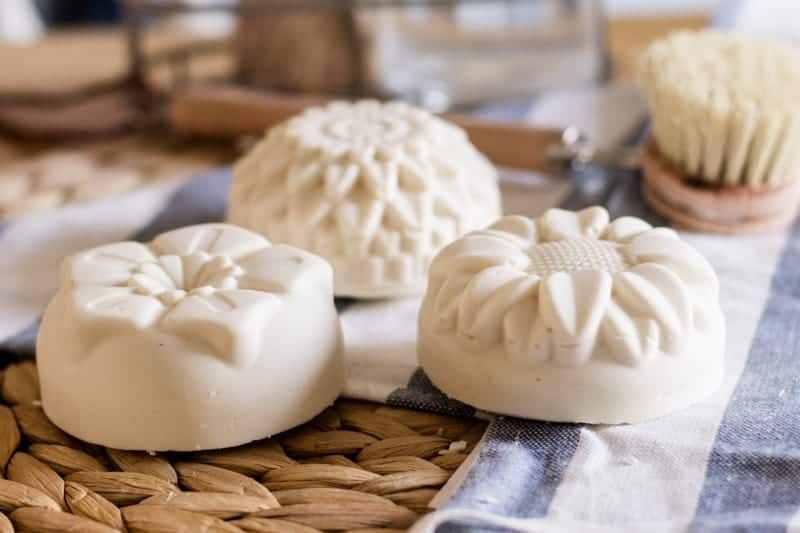
Making handmade soap bars has become a new hobby of mine. From shampoo bars to body soap bars, I find that making my own soap is a great way to save money and make a natural product.
This recipe is great for a hand soap bar and is super moisturizing! I especially love using this during the winter months when my hands are drier from the cooler weather.
Making your own handmade soap bars can be very easy, as long as you follow a few safety guidelines. Don’t worry; it is much easier than you think!
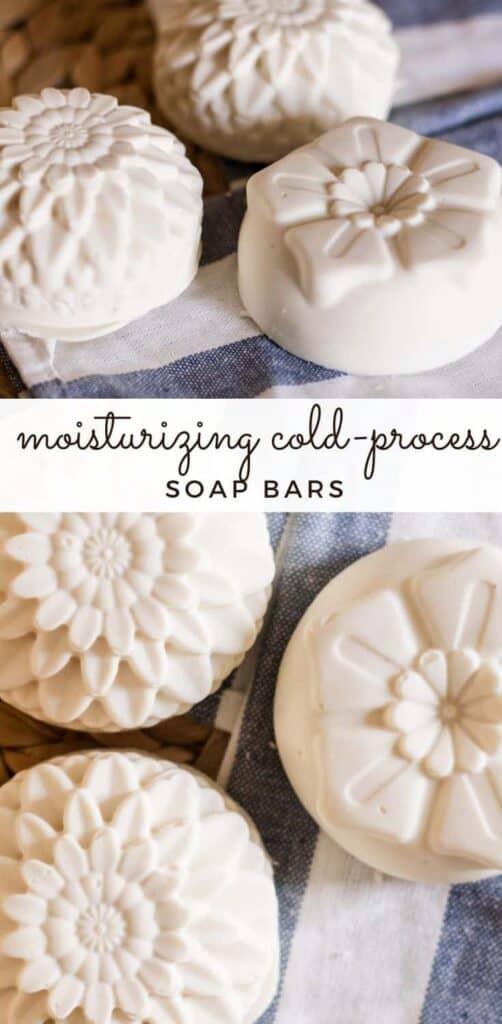
MOISTURIZING COLD PROCESS SOAP
One thing worth noting, cold process soap bars can be fully customized using a soap calculator. Punch in the ingredients that you want to use, and it will factor in the percentages of those ingredients needed as well as the lye and water.
I have made melt and pour soap bars and tallow soap bars, but I wanted to make a moisturizing cold process soap bar specifically for dry skin for this recipe.
Shea butter is very moisturizing for the skin. I also included cocoa butter and coconut oil as well. Together these ingredients make up a very moisturizing homemade soap bar.
INGREDIENTS NEEDED TO MAKE HOMEMADE SOAP
To keep this recipe easy, I am only using 5 ingredients: cocoa butter, coconut oil, shea butter, lye, and water.
COCOA BUTTER
I love using cocoa butter on my skin. In fact, you will find it in my whipped body butter, deodorant, and lip balm. It is uber moisturizing and rich in essential vitamins for healthy skin.
Cocoa butter forms a protective barrier on the skin, trapping in moisture. It can protect the skin against sun damage, slow down the signs of aging, and improve blood flow.
As a bonus, cocoa butter smells absolutely amazing! It smells like chocolate and is used to make delicate desserts, so yeah, it is included in this recipe.
COCONUT OIL
Similar to cocoa butter, you will find coconut oil in many of my skincare recipes. I use coconut oil in my anti-aging face cream and eye cream because it is excellent at reducing wrinkles and fine lines.
Coconut oil is also very moisturizing to the skin and can add hydration to dry damaged skin. It is very gentle and can be used on someone with sensitive skin.
SHEA BUTTER
Shea butter is another great moisturizer to add to this handmade soap bar. I use shea butter lotion during the winter to help add moisture to my dry skin.
Shea butter has a high concentration of fatty acids and vitamins that can help soften the skin.
Like the other ingredients found in this soap bar, shea butter is also good for sensitive skin, making these soap bars great for both adults and kids.
LYE
Lye is needed to make any soap bar. When lye is mixed with fats, soap is made. Lye is very dangerous on its own, but it is safe for the skin once it is mixed with the fat.
When dealing with lye, it is important to use proper safety gear like eye protection, long sleeves, and gloves. If possible, mix lye outdoors, or at the very least, in a well-ventilated room to avoid breathing it in.
WATER
When you make soap, you will need a liquid to mix with the lye. In most soap recipes, this must be water. Common alternatives include goat milk and coconut milk.
It is important to use distilled or filtered water. Regular tap water can often have chemicals, including chlorine, which could cause issues when interacting with the lye.
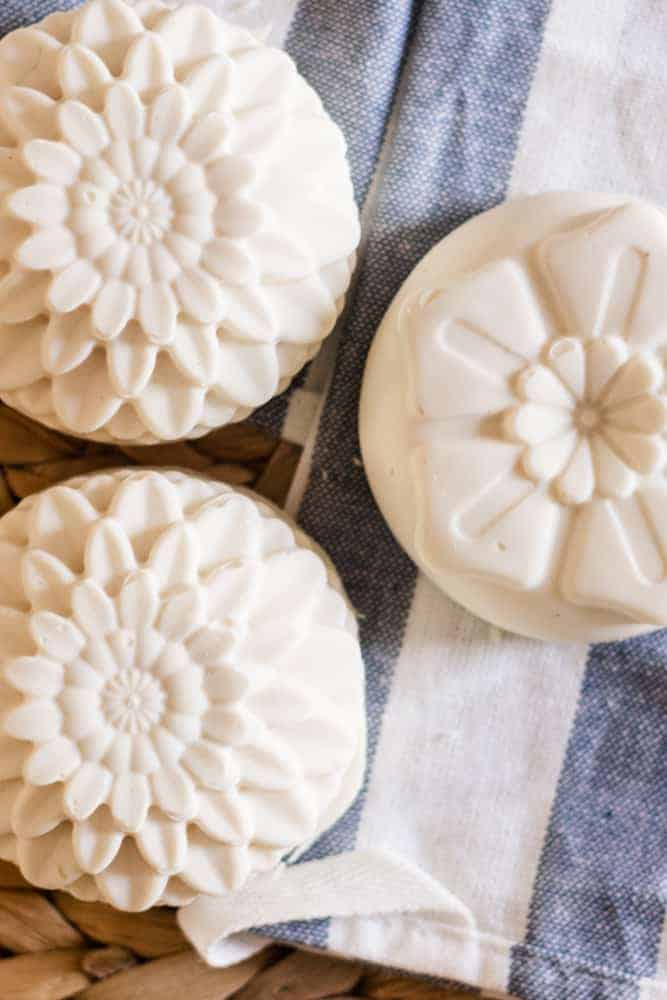
TOOLS NEEDED TO MAKE MOISTURIZING COLD PROCESS SOAP BAR
This post contains affiliate links, which means I make a small commission at no extra cost to you. As an Amazon Associate, I earn from qualifying purchases. Get my full disclosure HERE.
- Soap mold
- Immersion Blender
- Digital scale
- Glass bowl
- Gloves
- Eye protection
MOISTURIZING SOAP BAR RECIPE
I used a soap calculator to get these exact measurements. If you want to change up the recipe at all, you will need to get new measurements as it is imperative to use the exact amounts.
INGREDIENTS
- 6 ounces cocoa butter
- 5 ounces coconut oil
- 5 ounces shea butter
- 2.26 ounces lye
- 5.05 ounces water
- 15-20 drops essential oils, optional
INSTRUCTIONS
- Using a digital scale, measure out your water and pour it into a heat-resistant glass or metal.
- Measure out the lye and add it to the water. Stir the lye into the water slowly and stir until it dissolves. Note, the chemical reaction will cause it to heat up quickly.
- Using the digital scale, measure out the cocoa butter, coconut oil, and shea butter. Pour into a saucepan and melt over medium heat.
- Once the ingredients are melted, allow them to cool back down to 100 degrees.
- Once the fats reach 100 degrees, it is time to mix the lye water with the oils. Slowly add the lye and water to the oils, mix with an immersion blender. This will take a couple of minutes. You will know it is the right consistency when the soap from the blender drips and pools up at the top of the soap in the saucepan. This is known as the trace.
- If using essential oils, add those in now. Stir well.
- Pour the soap into the soap molds. If using silicone soap molds, you don’t have to do anything to them before pouring them in. Other molds may require parchment paper.
- Allow the soap to harden and sit in the molds for at least 24 hours or up to 3 days.
- Remove the soap from the molds and allow it to cure for 3-4 weeks before using.
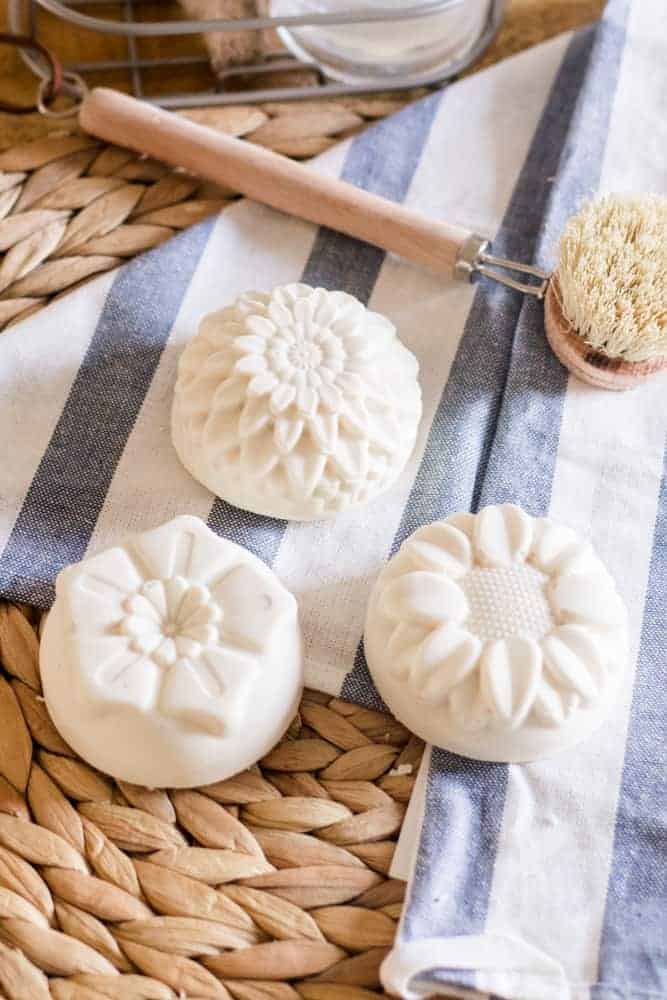
HOW TO CURE SOAP?
You can use a soap curing rack or just place the soap on a glass dish. Make sure the bars are not touching each other. I don’t have a curing rack yet, so I just stand the soap bars upright in a glass baking dish. Place them in a dry, cool, dark place for several weeks.
Curing soap is the process of allowing the soap bars to fully dry and to allow the process of saponification to finish. This typically takes 3-6 weeks. The longer it cures, the dryer the bar will be and the longer it lasts.
It is important to cure the soap before putting it in the shower, so it doesn’t melt and it will last longer.
Interested in more soap bars? Try these:
- Melt and Pour Goat Milk Soap Bars
- Shampoo Bars
- Dish Soap Bars
- Clear Glycerin Bars
- Shave Soap Bar
- Hibiscus Infused Loofah Bars
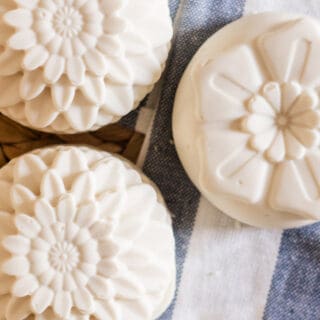
Moisturizing Cold Process Soap Recipe
Equipment
- Soap mold
- Glass Bowl
- Gloves
- Eye protection
Ingredients
- 6 ounces cocoa butter
- 5 ounces coconut oil
- 5 ounces shea butter
- 2.26 ounces lye
- 5.05 ounces liquid
- 15-20 drops essential oils optional
Instructions
- Using a digital scale, measure out your water and pour it into a heat-resistant glass or metal.
- Measure out the lye and add it to the water. Stir the lye into the water slowly and stir until it dissolves. Note, the chemical reaction will cause it to heat up quickly.
- Using the digital scale, measure out the cocoa butter, coconut oil, and shea butter. Pour into a saucepan and melt over medium heat.
- Once the ingredients are melted, allow them to cool back down to 100 degrees.
Once the fats reach 100 degrees, it is time to mix the lye water with the oils. Slowly add the lye and water to the oils, mix with an immersion blender. This will take a couple of minutes. You will know it is the right consistency when the soap from the blender drips and pools up at the top of the soap in the saucepan. This is known as the trace. - If using essential oils, add those in now. Stir well.
- Pour the soap into the soap molds. If using silicone soap molds, you don’t have to do anything to them before pouring them in. Other molds may require parchment paper.
- Allow the soap to harden and sit in the molds for at least 24 hours or up to 3 days.
- Remove the soap from the molds and allow it to cure for 3-4 weeks before using.
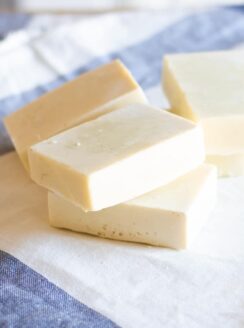
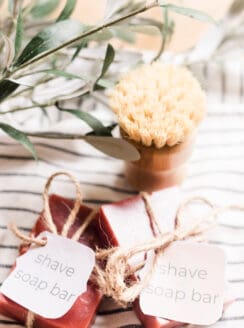
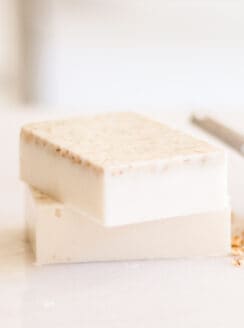
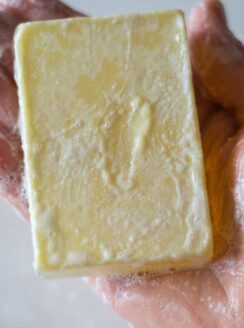
Tania says
Hello,
New soap maker here! I came across a couple if YouTube tutorials suggesting that the temperature of the Lye and the oils need to cool about 20° apart from each other.
What do you recommend that the Lye temperature should be?
Do you agree that the Lye and the oil temperatures should be 20° apart?
Laura says
I wait until the fats and lye water are cooled down to 120 degrees before mixing them.
Shelley Ann says
Hello ~ this sounds like a great recipe, however I am curious about the high amount of cocoa butter. I read percentages above 15% can cause the soap to be brittle? Or does the shea butter help balance that out?
Cindy says
I don’t like the smell of cocoa butter so I use all shea butter. I just add the ounces of both together. It has worked great multiple times. My molds are 1/2 to 1″ thick bars and have no issues with brittle.
Precious says
Thanks for sharing this simple soap recipe. What can I use to check if the oil coolness.
Laura says
I use an instant thermometer.
Raychel says
Hi! Could you share what superfatting percentage you used here? Trying to calculate for a larger batch. Thanks!